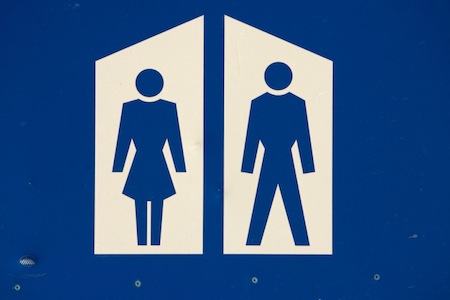As genderqueer, Ashe finds the “woman” label restricting, but still enjoys the privilege that comes with being able to pass as a woman.
When I was finishing university (in 2008) I spent a semester abroad in Egypt and it was awesome. I was studying Near Eastern archaeology at the time and being able to see ancient monuments in person was quite exciting. But the most memorable moment of my time in Egypt actually has nothing to do with archaeology; it was when a woman looked at me and thought I might be a man.
I am female-identified and genderqueer (a catch-all term for gender identities other than man and woman), so usually people assume I’m a woman. Even with my short hair, men’s clothing, and lack of jewelery or makeup, I’m usually assumed to be a masculine woman. My body reads female to western culture, and female is equated with woman. Actually, at the time I was in Egypt, I did identify as a woman. I had internalized the idea that female = woman. The first time anyone had ever questioned whether I was a woman was when that woman in Egypt asked me if I was a man.
For a few moments after she asked me that question, I felt a certain freedom and relief at having my gender questioned. But that feeling of freedom was quickly quashed when I realized I had to answer her question. See, I was going into the women’s dorms (where I lived in Egypt), and so I had to answer that I was a woman. It was her job to make sure that men didn’t go into the women’s dorm rooms. I had to tell her a few times, in English and Arabic, that I was a woman and that I lived in the dorms. She eventually believed me, and that was the end of that.
So cut to just a few weeks ago: I was having an argument with someone that turned kind of mean. At one point, I was told that regardless of me being genderqueer, since I am assumed to be a woman most of the time, I benefit from what is known as cis-privilege because I can pass as cisgenderd. In other words, because my biological sex and gender identity appear to match up as society expects (cisgendered), I benefit from the social privilege associated with being “normal” when it comes to gender identity (cis-privilege). On a very deep, personal level, I resented being told that I had passing privilege because I was usually assumed to be a cis-woman. It was the exact opposite of the freedom I’d felt from my experience in Egypt. I felt like I was being restricted and forcibly shoved into a box labeled “woman.” What’s worse, I felt like I was being told I should be glad that I was able to pass as the label “woman,” which I found so restricting.
One of the most frustrating aspects of being genderqueer (for me, anyway) is the invisibility of that identity. In our binary gender system, I am always forced to choose to label myself as “man” or “woman.” Because my body is pretty obviously female, I go along with it when people call me a woman. It’s easier than trying to explain the reality of my gender identity.
It’s another kind of closet, really. Only it feels worse because it’s a closet for an identity that large numbers of people don’t even think really exists. I’ve had conversations about what genderqueer is, and often the response I’ve gotten is that it must be the same thing as being a butch woman or a feminine man. It isn’t, and getting people to recognize that is like pulling teeth without novocaine.
That’s my personal and emotional reaction to being told I benefit from cis-privilege. While I’d argue it’s valid and definitely worth examining, it’s also only part of the story. The hard, cold fact is that as much as I hate the invisibility of being genderqueer, I also benefit from that invisibility. I have “passing privilege.” My experience in Egypt was freeing precisely because it was such a unique experience for me. However, my passing privilege meant that none of the other women guarding the door to the women’s dorms questioned my gender.
On a very basic level, it means that when I go out in public, people don’t give me strange glances because of my appearance. People look at me and think “relatively normal woman,” if they pay attention to me at all. When I apply for a job, I don’t have to worry that my gender identity might be a deciding factor in whether I’m hired or not. When I go out on a date, I can keep my gender identity secret and not worry that it might accidentally be revealed. What’s more, as an assumed-woman I have greater flexibility in my expressions of feminine and masculine behavior. I can wear makeup (or not), wear pink (or not), show emotion (or not), etc., and still continue to benefit from passing privilege.
Gender is something that permeates so much of our culture that being able to pass as someone with a so-called normal gender identity is a benefit itself. In fact, it’s such a big benefit that I am writing this article anonymously. Heck, even in my other writing online I identify myself as a woman because I don’t want to lose my cis-gender privilege. At the same time I’m expressing my frustration and anger at the invisibility of being genderqueer, I’m participating in the problem by remaining largely invisible.
Ashe is a Californian living in the United Kingdom, where she recently stopped her PhD in archaeology to study more contemporary cultures, like her own. When she’s not studying, she spends far too much time reading, writing, and blogging about issues of gender identity and sexual orientation.
Related Links:

